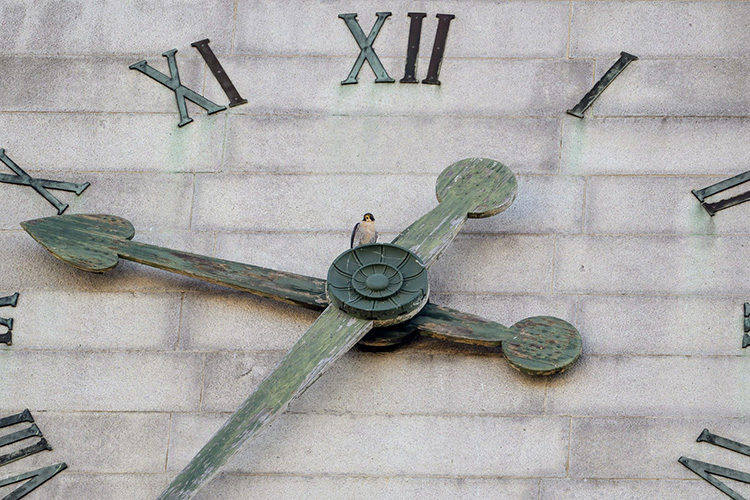It’s Valentine’s Day: Let’s name Annie the falcon’s new mate
With Alden, her 2022 mate, missing, Annie's welcomed a new male to her Campanile home, where egg-laying is likely just a month away
February 14, 2023

It’s time to name the new male falcon, shown here, that appears to be Annie’s new mate. The contest starts today. (Photo by Bridget Ahern)
He’s got orange feet, is large for male, has a high-pitched, chirpy voice and occasionally leaves food lying around where he shouldn’t.
And he’s an apparent love match for Annie, UC Berkeley’s longtime peregrine falcon. Well, except for the part about him dropping prey into the nest on the Campanile where Annie usually lays eggs in mid-March.
Annie, an approximately nine-year-old falcon that has lived on campus since late 2016 and last year lost her longtime mate, Grinnell, and likely her next mate, Alden, has been bonding with a new male for more than a month. Cal Falcons has decided he’s a keeper, and that it’s time to give him a Berkeley name.
“Falcon courtship involves several different behaviors, including head-bow displays in the nest box, prey deliveries and aerial acrobatics, culminating with copulation,” said Sean Peterson, an environmental biologist with Cal Falcons. “We’ve seen all of those behaviors, which kind of cements that Annie and the ‘New Male’ are very likely to pair this year.”

A Valentine created for 2023 by Cal Falcons. Can you hear the Carpenters’ “(They Long to Be) Close to You”? (Cal Falcons image)
Today, Valentine’s Day, the naming contest begins. The public is invited to submit suggestions via Cal Falcons’ social media channels: Instagram, Facebook and Twitter.
“All suggestions should be UC Berkeley-related — be they honoring a person, a characteristic of the landscape, a discovery, a work of art,” said Peterson, “as we hope our falcons will be around for many years and closely related to the campus for a long time.”
Hurry, as the contest will close to suggestions already this Thursday, Feb. 16. The following day, a list of finalist names selected by Cal Falcons volunteers will be shared with the public, and voting on those will end Wednesday, Feb. 22. Later that day, the winning name will be revealed.
Last year, after Grinnell was found dead in downtown Berkeley, and after a new male arrived within hours to take his place, the public voted to name that successor Alden, after Alden Miller (1906-1965), an American ornithologist and Berkeley alumnus. Miller succeeded Joseph Grinnell as director of Berkeley’s Museum of Vertebrate Zoology. Grinnell was the museum’s first director; Grinnell the falcon was named after him.

The new male falcon flies above Annie on a clear, blue sky day on campus. (Photo by Bridget Ahern)
But Alden is nowhere to be found as Annie, in middle age, enters her seventh breeding season. Falcons in the wild can live and breed for 15 years or more.
“There’s been no sign of Alden. It’s still a mystery,” said Peterson. “I think the most likely scenario is that he died. It’s still possible he’ll show up again, but that’s not very likely.”
The new male falcon appears to be winning Annie’s heart by killing birds and presenting them to her, which is helpful not only for courting purposes, but because Annie will need extra nutrition as mating season progresses.
“It took him a long time to bring food to Annie, and to let her take it from him, and bringing it into the nest isn’t great. But it’s clear she’s eating, and he’s doing well enough,” said Mary Malec, a member of Cal Falcons who monitors local raptor nests for the East Bay Regional Park District. “Of course, when they feed the chicks, they’re fed in the nest. But the rest of the time, he should leave the prey outside.”
Annie and her mate are “solidly in the courtship phase of the breeding season,” said Peterson.
In the Bay Area, he explained, the first egg of any nest is laid around March 1. Annie typically has laid eggs in mid-March (specifically, March 12-24). Sometimes, he added, delayed laying can happen due to weather or to unsettled territories, like Annie experienced last year with the drama surrounding Grinnell’s death, Annie’s unusual disappearance from the nest and Alden’s arrival.
“They do wait until optimal conditions,” said Peterson, “so delayed laying isn’t uncommon.”

The soon-to-be-named new adult male, of unknown age, has orange feet and lighter-colored breast feathers than Annie, plus more grey coloring on his back. (Photo by Bridget Ahern)
Malec said the new male also is distinguished from Annie by lighter-colored feathers and lower, bar-shaped markings on his breast, more grey feathers on his back and a much higher-pitched call, which is typical of most male falcons.
His age is unknown. Malec and Peterson said he is an adult, but perhaps a younger one that, although he is very good at catching prey, “has been a little hesitant about delivering it to Annie,” said Peterson. “That particular quirk makes us think that he’s relatively young and still learning the ropes.”
Added Malec, “It’s possible that he hasn’t done this before.”
No matter what, Peterson said he believes the public will “love this new male as much as Alden, who they fell in love with immediately” after Grinnell’s death, when he began hunting for Annie and helping her incubate the eggs in the nest just seven hours after Grinnell’s body was found.
“At other nesting sites that are more established,” he added, “I think people kind of get used to a rotating cast of characters, but that doesn’t prevent people from still enjoying the cameras and the nest site.”
You can watch Berkeley’s falcon breeding season unfold 24/7 on the Campanile webcams.